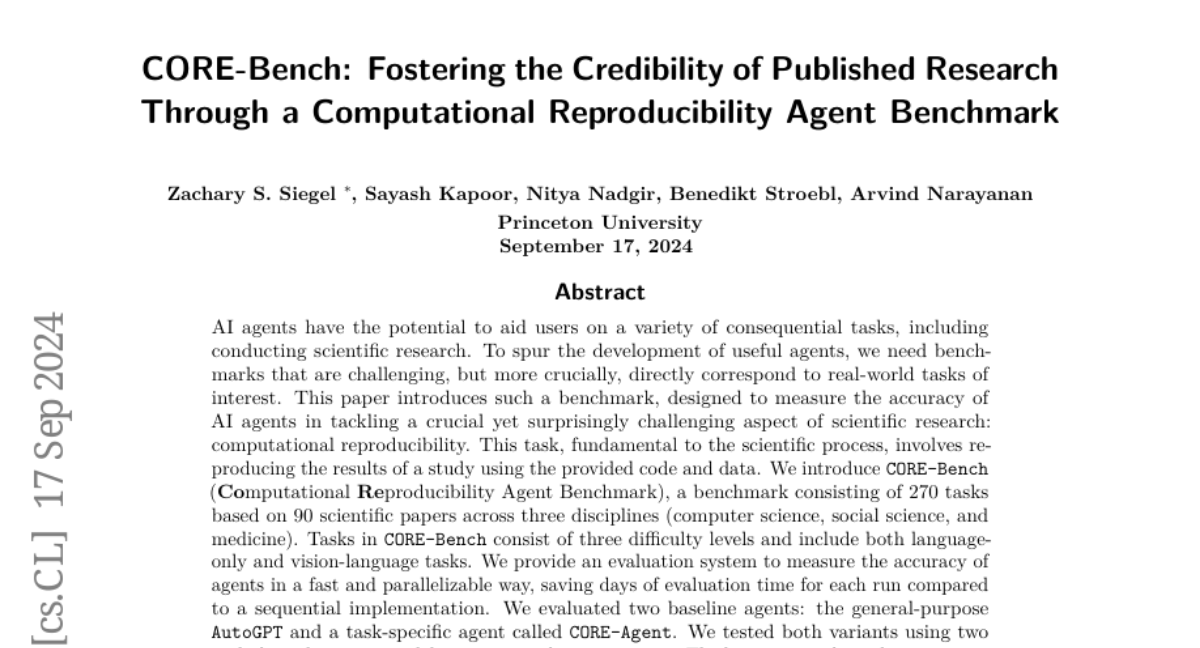CORE-Bench: Fostering the Credibility of Published Research Through a Computational Reproducibility Agent Benchmark
Zachary S. Siegel, Sayash Kapoor, Nitya Nagdir, Benedikt Stroebl, Arvind Narayanan
2024-09-19

Summary
This paper introduces CORE-Bench, a benchmark designed to evaluate the ability of AI agents to reproduce scientific research results, which is crucial for ensuring the credibility of published studies.
What's the problem?
In scientific research, it is important that other researchers can replicate studies to verify results. However, many published studies do not provide clear instructions or code, making it difficult to reproduce their findings. This lack of reproducibility can undermine trust in scientific results and hinder further research.
What's the solution?
CORE-Bench addresses this issue by providing a set of 270 tasks based on 90 scientific papers from fields like computer science, social science, and medicine. These tasks are categorized into three difficulty levels and include both language-only and vision-language tasks. The benchmark measures how well AI agents can reproduce the computational experiments described in these papers. The authors also evaluated two AI agents—AutoGPT and CORE-Agent—using different language models to see how effectively they could complete the tasks.
Why it matters?
This research is important because it helps improve the reliability of scientific research by ensuring that findings can be verified through reproducibility. By creating a standardized benchmark like CORE-Bench, researchers can better evaluate AI agents' abilities to assist in scientific tasks, ultimately leading to more trustworthy and credible research outcomes.
Abstract
AI agents have the potential to aid users on a variety of consequential tasks, including conducting scientific research. To spur the development of useful agents, we need benchmarks that are challenging, but more crucially, directly correspond to real-world tasks of interest. This paper introduces such a benchmark, designed to measure the accuracy of AI agents in tackling a crucial yet surprisingly challenging aspect of scientific research: computational reproducibility. This task, fundamental to the scientific process, involves reproducing the results of a study using the provided code and data. We introduce CORE-Bench (Computational Reproducibility Agent Benchmark), a benchmark consisting of 270 tasks based on 90 scientific papers across three disciplines (computer science, social science, and medicine). Tasks in CORE-Bench consist of three difficulty levels and include both language-only and vision-language tasks. We provide an evaluation system to measure the accuracy of agents in a fast and parallelizable way, saving days of evaluation time for each run compared to a sequential implementation. We evaluated two baseline agents: the general-purpose AutoGPT and a task-specific agent called CORE-Agent. We tested both variants using two underlying language models: GPT-4o and GPT-4o-mini. The best agent achieved an accuracy of 21% on the hardest task, showing the vast scope for improvement in automating routine scientific tasks. Having agents that can reproduce existing work is a necessary step towards building agents that can conduct novel research and could verify and improve the performance of other research agents. We hope that CORE-Bench can improve the state of reproducibility and spur the development of future research agents.